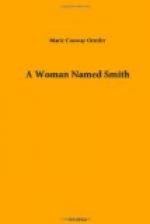I can fancy the ancient beldam sniggering sardonically the while she figured to herself the chagrined astonishment, the helpless wrath, of her watchfully waiting neighbors, when they should discover that historic Hynds House, dating from the beginning of things Carolinian, had passed into the unpedigreed hands of a woman named Smith. I can fancy her balefully exact perception of the attitude so radically conservative a community must needs assume toward such an intruder as myself, foisted upon it, so to speak, by an enemy who never failed to turn the trick.
Because I’m not a Hynds, at all. Great Aunt Sophronisba was my aunt not by blood but by marriage; she having, when she was no longer what is known as a spring chicken, met my Great-Uncle Johnny Scarlett and scandalized all Hyndsville by marrying him out of hand.
I have heard that she was insanely in love with him, and I believe it; nothing short of an over-mastering passion could have induced one of the haughty Hyndses to marry a person with such family connections as his. For my father, George Smith, was a ruddy English ship-chandler who pitched upon Boston for a home, and lived with his family in the rooms above his shop; and my grandmother Smith dropped her “aitches” with the cheerful ease of one to the manner born, bless her stout old Cockney heart! I can remember her hearing me my spelling-lesson of a night, her spectacles far down on her old button of a nose, her white curls bobbing from under her cap.
“What! Carn’t spell ‘saloon’? Listen, then, Miss: There’s a hess and a hay and a hell and two hoes and a henn! Now, then, d ’ye spell it!”
Not that Mrs. Johnny ever accepted us. It was borne in upon the Smiths that undesirable in-laws are outlaws. This despite the fact that my mother’s pink-and-white English face was a gentler copy of what her uncle’s had been in his youth; and that when I came along, some years after the dear old man’s death, I was named Sophronisba at Mrs. Johnny’s urgent request.
After Great-Uncle Johnny died, as if the last tie which bound her to ordinary humanity had snapped, his widow retired into a seclusion from which she emerged only to sue somebody. She said the world was being turned topsyturvy by people who were allowed to misbehave to their betters, and who needed to be taught a lesson and their proper place; and that so long as she retained her faculties, she would do her duty in that respect, please God!
She did her duty so well in that respect that the Hynds fortune, which even civil war and reconstruction hadn’t been able altogether to wreck, dwindled to a mere fifteen thousand dollars; and she wasn’t on speaking terms with anybody but Judge Gatchell, her lawyer. She would have quarreled with him, too, had she dared.
To the minister, who bearded her for her soul’s sake every now and then, she spoke in words brief and curt:
“You here again? Wanted to see me, hey? Well, you’ve done it. Now get out!”




